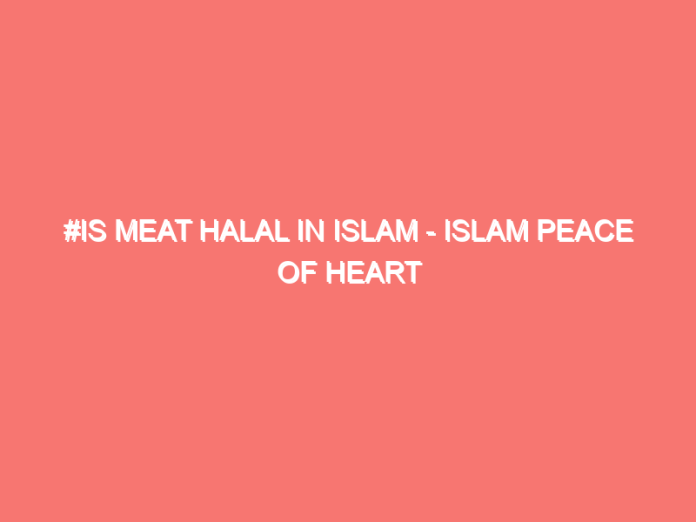Is Meat Halal In Islam
Introduction:
Meat is an important part of many people’s diets, but for those following Islamic dietary laws, the question of whether meat is halal or not is of vital importance. Halal meat, according to Islamic law, is meat that has been prepared and slaughtered in a specific way and is considered permissible for consumption. In this article, we will explore the concept of halal meat in Islam, including its types, importance, pros and cons, health benefits, and conclusion.
Types Of Halal Meat:
Halal meat can be divided into two main categories: beef and poultry. Beef includes meat from cows, buffalo, and camels, while poultry includes meat from chickens, ducks, and geese. In addition, halal meat also includes fish and seafood which are considered halal in Islam.
Importance Of Halal Meat:
Halal meat is considered very important in Islam as it is believed to be pure and free from any impurities. It is also believed that consuming halal meat will bring blessings and good health. Muslims also see it as a way to fulfill their religious obligations and as a way to maintain their spiritual and physical well-being.
Pros and Cons:
One of the main advantages of halal meat is that it is considered pure and clean, and is therefore considered to be of high quality. This is because it is prepared and slaughtered in a specific way, ensuring that the animal is treated humanely and that the meat is free from any impurities. However, one of the cons is that it may be more difficult to find halal meat in some areas, and it may also be more expensive.
Health Benefits:
There are several health benefits associated with consuming halal meat. For example, it is leaner than non-halal meat, which means that it contains less fat and is therefore considered to be healthier. In addition, halal meat is also believed to be more nutritious than non-halal meat, as it is free from any impurities.
Some Main Points About Meat:
In addition to the points previously mentioned, there are a few more things to consider when discussing halal meat in Islam:
Halal slaughter:
In order for meat to be considered halal, it must be slaughtered in a specific way. The animal must be alive and healthy at the time of slaughter, and the slaughter must be performed by a Muslim. The animal must also be facing Mecca and the slaughter must be done with a sharp knife while pronouncing the name of Allah. This method is believed to be less painful for the animal and it’s said to be more humane.
Zabiha:
Zabiha is the term used to refer to the meat that has been slaughtered according to Islamic law. It is considered to be the purest form of meat and is highly sought after by many Muslims.
Quranic Verse:
Muslims follow the verse in Quran (5:5) “Made lawful to you this day are At-Tayyibat [all kinds of Halal (lawful) foods, which Allah has made lawful (meat of slaughtered eatable animals, milk products, fats, vegetables, and fruits)”.
Global halal meat market:
The global halal meat market is a rapidly growing industry, with an increasing demand for halal meat from both Muslim and non-Muslim consumers. Many countries are also exporting halal meat to other countries with large Muslim populations, such as Indonesia, Malaysia, and Saudi Arabia.
Health And Safety Concerns:
With the increase in demand for halal meat, there have been concerns about the health and safety of halal meat products. Some people worry about the use of hormones and antibiotics in halal meat production. It’s important to note that halal certification bodies and organizations are responsible for ensuring that halal meat products are produced according to halal regulations and guidelines and that they meet health and safety standards.
Conclusion:
In conclusion, halal meat is an important part of Islamic dietary laws. It is considered pure and clean and is therefore considered to be of high quality. It is also believed to bring blessings and good health. However, it may be more difficult to find and more expensive than non-halal meat. As with any dietary choice, it’s important to consult with healthcare professionals and experts to ensure that your diet is balanced and healthy.








